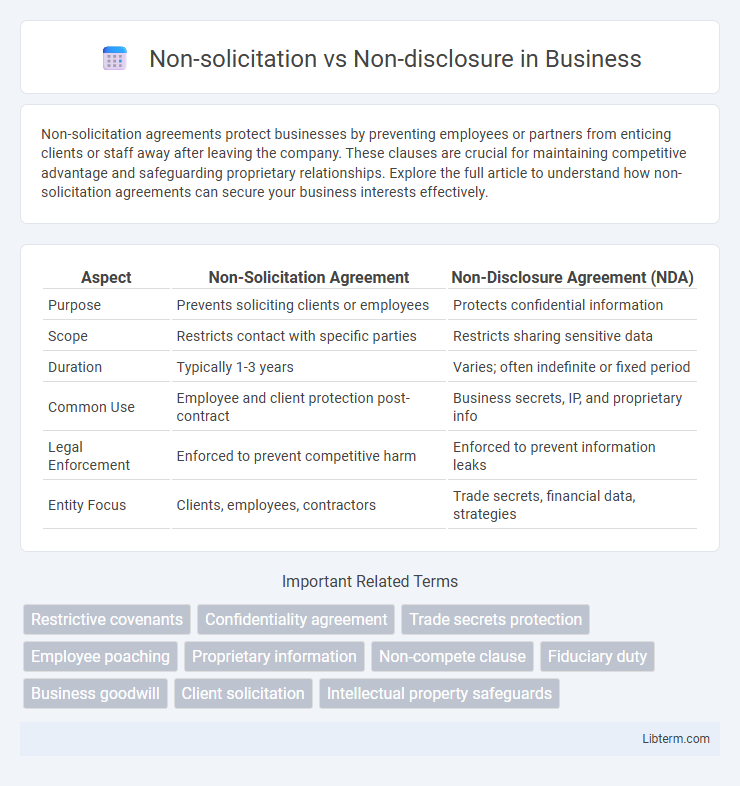Non-solicitation agreements protect businesses by preventing employees or partners from enticing clients or staff away after leaving the company. These clauses are crucial for maintaining competitive advantage and safeguarding proprietary relationships. Explore the full article to understand how non-solicitation agreements can secure your business interests effectively.
Table of Comparison
| Aspect | Non-Solicitation Agreement | Non-Disclosure Agreement (NDA) |
|---|---|---|
| Purpose | Prevents soliciting clients or employees | Protects confidential information |
| Scope | Restricts contact with specific parties | Restricts sharing sensitive data |
| Duration | Typically 1-3 years | Varies; often indefinite or fixed period |
| Common Use | Employee and client protection post-contract | Business secrets, IP, and proprietary info |
| Legal Enforcement | Enforced to prevent competitive harm | Enforced to prevent information leaks |
| Entity Focus | Clients, employees, contractors | Trade secrets, financial data, strategies |
Understanding Non-Solicitation Agreements
Non-solicitation agreements specifically prevent employees or former employees from approaching clients, customers, or other employees to induce them to leave the company, safeguarding business relationships and proprietary workforce structures. Unlike non-disclosure agreements (NDAs), which primarily protect confidential information from being disclosed to outside parties, non-solicitation agreements focus on restricting competitive poaching and direct solicitation activities. These agreements are crucial in maintaining competitive advantage by limiting access to valuable contacts and preserving internal talent pools.
What is a Non-Disclosure Agreement (NDA)?
A Non-Disclosure Agreement (NDA) is a legally binding contract that protects confidential information shared between parties by restricting unauthorized disclosure. Unlike non-solicitation agreements that prevent poaching employees or clients, an NDA specifically safeguards trade secrets, proprietary data, and sensitive business information. NDAs are crucial in industries such as technology, healthcare, and finance to maintain competitive advantages and ensure privacy compliance.
Key Differences: Non-Solicitation vs Non-Disclosure
Non-solicitation agreements prevent employees or former employees from poaching clients, customers, or other employees, protecting business relationships and workforce stability, while non-disclosure agreements (NDAs) safeguard confidential information from unauthorized sharing or use. Non-solicitation clauses focus primarily on restricting competitive actions involving contacts and talent, whereas non-disclosure clauses concentrate on maintaining the secrecy of proprietary information, trade secrets, and intellectual property. Understanding these key differences is crucial for businesses aiming to protect both their competitive position and sensitive data through appropriate contractual measures.
Common Clauses in Non-Solicitation Contracts
Non-solicitation contracts typically include clauses restricting employees or contractors from soliciting clients, customers, or employees of the employer during and after the term of employment, often specifying a defined duration and geographic scope to ensure enforceability. Common clauses involve prohibitions against poaching key personnel and contacting existing clients with whom the signatory had direct dealings, safeguarding business relationships and intellectual property. These contracts frequently incorporate remedies for breach, such as injunctive relief and monetary damages, emphasizing their role in maintaining competitive advantage and protecting confidential information.
Typical Provisions in Non-Disclosure Agreements
Non-disclosure agreements (NDAs) typically include provisions such as the definition of confidential information, obligations of the receiving party to protect that information, and the duration of confidentiality. NDAs also specify exclusions from confidentiality, like information already public or independently developed, and outline the consequences of unauthorized disclosure. These provisions differentiate NDAs from non-solicitation agreements, which focus on restricting solicitation of employees or clients rather than protecting proprietary information.
Legal Implications of Breaching Either Agreement
Breaching a non-solicitation agreement can result in legal consequences such as injunctions, monetary damages, and potential loss of business relationships due to attempts to recruit employees or clients unlawfully. Violating a non-disclosure agreement typically leads to lawsuits for breach of confidentiality, risking exposure of trade secrets or proprietary information, which can cause significant financial losses and damage to competitive advantage. Courts often enforce both agreements rigorously to protect business interests and uphold contractual obligations, emphasizing the importance of compliance to avoid costly litigation.
Use Cases: When to Use Each Agreement
Non-solicitation agreements are best utilized to protect a company's workforce and client relationships by prohibiting employees or partners from recruiting clients or staff after leaving the organization. Non-disclosure agreements (NDAs) are essential when sharing sensitive, proprietary, or confidential information, ensuring that trade secrets, product designs, or business strategies remain protected. Use non-solicitation clauses primarily in employment contracts or partnership exits, while NDAs apply during negotiations, collaborations, or any scenario requiring confidentiality of critical business information.
Enforceability and Limitations of Both Agreements
Non-solicitation agreements are enforceable when narrowly tailored to protect legitimate business interests, such as preventing former employees from poaching clients or staff, but courts often limit their scope in time and geography to avoid undue restraint on trade. Non-disclosure agreements (NDAs) generally have broader enforceability as they protect confidential information and trade secrets, with courts upholding them provided the information is legitimately confidential and the terms are reasonable. Both agreements face limitations: non-solicitation clauses may be invalidated if overly broad or vague, while NDAs can be unenforceable if they restrict information already public or improperly limit an employee's ability to work in their field.
Tips for Drafting Effective Non-Solicitation and NDA Clauses
Draft clear definitions of key terms within non-solicitation and non-disclosure agreements to avoid ambiguity and enhance enforceability. Specify the scope, duration, and geographic limitations precisely, ensuring that restrictions are reasonable and compliant with local laws. Incorporate tailored clauses addressing what constitutes solicitation or confidential information, supported by concrete examples to reduce misinterpretation and potential disputes.
Choosing the Right Agreement for Your Business Needs
Selecting the appropriate agreement between non-solicitation and non-disclosure hinges on the specific protection your business requires. Non-solicitation agreements prevent former employees or partners from targeting clients or staff, securing your company's relationships and workforce. Non-disclosure agreements safeguard sensitive information from being shared or exploited, ensuring proprietary data and trade secrets remain confidential and protected.
Non-solicitation Infographic

 libterm.com
libterm.com